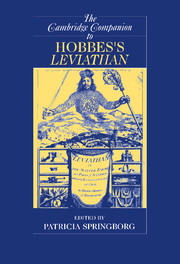Book contents
- Frontmatter
- General Introduction
- Part I: Of Man
- Part II: Of Commonwealth
- Part III: Of a Christian Commonwealth
- Part IV: Of the Kingdom of Darkness
- 14 Hobbes’s Critique of the Doctrine of Essences and Its Sources
- 15 Leviathan and Its Anglican Context
- 16 The Bible and Protestantism in Leviathan
- 17 The 1668 Appendix and Hobbes’s Theological Project
- Part V: Hobbes’s Reception
- Bibliography
- Index
- Series List
15 - Leviathan and Its Anglican Context
from Part IV: - Of the Kingdom of Darkness
Published online by Cambridge University Press: 28 November 2007
- Frontmatter
- General Introduction
- Part I: Of Man
- Part II: Of Commonwealth
- Part III: Of a Christian Commonwealth
- Part IV: Of the Kingdom of Darkness
- 14 Hobbes’s Critique of the Doctrine of Essences and Its Sources
- 15 Leviathan and Its Anglican Context
- 16 The Bible and Protestantism in Leviathan
- 17 The 1668 Appendix and Hobbes’s Theological Project
- Part V: Hobbes’s Reception
- Bibliography
- Index
- Series List
Summary
Late in life Hobbes penned a Latin prose autobiography. In it he talked about the composition of Leviathan. He recorded that he had hoped the book would not be displeasing to his fellow-citizens, but 'especially to those who had sided with the bishops' - that is to say, to Anglicans. He claimed that although there was no church government at all in England at the time when he was working on Leviathan, and that everyone had therefore been free to write and publish what they pleased on theological matters, he had in fact been careful to say nothing in it that contradicted the doctrine of the Church of England as it had been constituted by royal authority before the Civil War. He asserted that 'he had always approved the government of the church by bishops before all other forms' and he related how he had refused Catholic rites when he had been gravely ill in France, but had shortly afterwards accepted Anglican rites from John Cosin (later Bishop of Durham). Hobbes also insisted that after he returned to England he had not worshipped in any of the country's puritan churches, where he had encountered only seditious preaching and 'extemporary prayers', but had sought out an Anglican congregation, though it was more than a mile from where he lived. In those times, no law required anyone to attend any church, and the fact that Hobbes had voluntarily, and at considerable inconvenience, gone to an Anglican church was (on his own account, at least) evidence of his Anglicanism and of his sincere Christianity.
- Type
- Chapter
- Information
- The Cambridge Companion to Hobbes's Leviathan , pp. 358 - 374Publisher: Cambridge University PressPrint publication year: 2007
- 1
- Cited by

